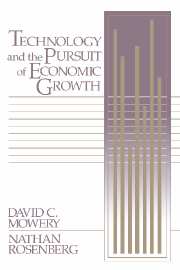Book contents
- Frontmatter
- Contents
- Preface
- Part I Introduction
- 1 A new framework for research and development: Analysis and policy implications
- Part II The development of the institutional structure, 1860–1940
- Part III The development of the postwar system, 1940–1987
- Part IV New environment, new research organizations
- Bibliography
- Index
1 - A new framework for research and development: Analysis and policy implications
Published online by Cambridge University Press: 22 March 2010
- Frontmatter
- Contents
- Preface
- Part I Introduction
- 1 A new framework for research and development: Analysis and policy implications
- Part II The development of the institutional structure, 1860–1940
- Part III The development of the postwar system, 1940–1987
- Part IV New environment, new research organizations
- Bibliography
- Index
Summary
Technology's contribution to economic growth and competitiveness has been the subject of a large and growing literature in recent years. This debate has been spurred in part by a recognition of the importance of innovation in an economy that is increasingly open to the products of foreign firms that have proven to be the technological and economic equals of U.S. firms in a number of industries. Many contributors to this literature and a growing number of policymakers are concerned with the design of public policies that can improve the innovative performance of U.S. firms and with the training of U.S. managers to better manage technological change.
Economists have contributed a great deal to the identification of the importance and (imprecisely) the measurement of the contribution of technological change to economic growth. It is therefore surprising that economists have not played a more prominent role in recent debates of science and technology policies. In our view, the potential contributions of economics to the development of improved public and private policies for innovation have been hampered by the limitations of the theoretical framework employed by most economists for the analysis of innovation. This book is intended to aid the development of an alternative framework for the analysis of innovation and the design of policies for its support and management.
The chapters in this book do not develop a comprehensive alternative theory of innovation; indeed, the analytic insights offered here complement those of the neoclassical economic framework.
- Type
- Chapter
- Information
- Technology and the Pursuit of Economic Growth , pp. 3 - 18Publisher: Cambridge University PressPrint publication year: 1989
- 1
- Cited by



